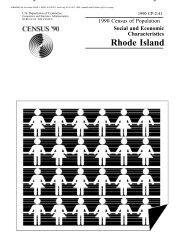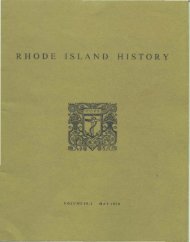Untitled - Rhode Island Historical Society
Untitled - Rhode Island Historical Society
Untitled - Rhode Island Historical Society
You also want an ePaper? Increase the reach of your titles
YUMPU automatically turns print PDFs into web optimized ePapers that Google loves.
Notes continwed<br />
interest in factory operatives, a biographical<br />
sketch of \X/yman written in the 1890s<br />
suggests another influence, attributing her<br />
interest in labor issues to the time she spent<br />
in Rome while on a European tour with<br />
her mother and sister in the early .1870s.<br />
According to the biographical entry, for<br />
which Wyman herself may have supplied<br />
the information, while in Rome she developed<br />
an interest in "liberal Italian politics"<br />
and soon began to feel very strongly that<br />
"the labor question and kindred social<br />
questions were the most pressing and<br />
important ones of her time, and that they<br />
should engage the attention of all conscientious<br />
persons." Frances E.'V7illard and<br />
Mary A. Livermore, eds., A Woman of the<br />
Century (Buffalo: Charles'Wells Moulton,<br />
1893),806.<br />
46. L.B. C. ftillie B. Chace], "Country<br />
Whiffs," Woman's Journal, 1,0 Sept. 1"870,<br />
p.282.<br />
47. Lrllie then cited "the Rev. Petroleum V.<br />
Nasby," who had questioned "whether an<br />
employer has the moral right to trade in<br />
the agony of a woman who struggles to<br />
preserve her chastitn and to grind her<br />
down to the lowest wages on which she<br />
can keep body and soul together, and<br />
preserve both pure." Ibid.<br />
48. Lillie B. Chace [S. A. L. E. M., pseud.l,<br />
"The Child of the State," Atlantic Monthly<br />
40 (September 1877): 334-47 . Lillie used<br />
the pseudonym S. A. L. E. M. for her first<br />
published stories. The letters undoubtedly<br />
stood for the names of Lillie and her<br />
siblings.<br />
49.Ibid.,336.<br />
50. Ibid.,334,335<br />
51. Lillie B. Chace [S. A. L. E. M., pseud.],<br />
"Saint or Sinner," Atlantic Montbly 41.<br />
(April 1878): 468-84.<br />
52. A biographical sketch ofJohn'S7yman<br />
appears in Alfred M. Williams and<br />
Villiam F. Blanding, eds., Biographical<br />
Shetches and Portraits of Leaders in<br />
Business and Professional Life in the State<br />
of <strong>Rhode</strong> <strong>Island</strong> and Prouidence Plantations,<br />
comp. Richard Herndon (Boston:<br />
New England Magazine, 1"896), 1, 51-52.<br />
53. Lillie Buffum Chace Wyman, American<br />
Chiualry (Boston: W. B. Clarke Co., 1913),<br />
125-27.<br />
54. "I have always been proud of my antislavery<br />
relations," Lillie Wyman would<br />
write a friend in 1.924, "and that I married<br />
into the same moral connection." Lillie<br />
Chace \(/yman to Angelina Weld Grimk6,<br />
3 Dec. 1,924, Grimk6 Papers, Moorland-<br />
1,32 "\(/AS SHE CLOTHED \rITH THE RENTS PAID FOR THESE \TRETCHED ROOMS<br />
Spingarn Research Center, Howard<br />
University.<br />
55. \7illiam Lloyd Garrison to rWendell<br />
Phillips, 30 Oct. 1878, in l(alter M.<br />
Merrill and Louis Ruchames, eds., To<br />
Rouse tbe Slumbering Ldnd: The Letters of<br />
\Yilliam LIoy d G arris on ( Cambridge,<br />
Mass.: Belknap Press of Harvard<br />
University Press, 1981 ), 6:532-33.<br />
56. L. B. C. \fyman and A. C. Vyman,<br />
Elizabeth Buffum Chace 2:162.<br />
57. Lillie Chace'Wyman [S. A. L. E. M.,<br />
pseud.l, "Hester's Dolver," Atlantic<br />
Monthly 48 (December 1881): 792-80i.<br />
s8. rbid., 793.<br />
59. Lillie Chace rVyman [S. A. L. E. M.,<br />
pseud.l, "And Joe," Atlantic Monthly 49<br />
(January 1882):38-56.<br />
60. Ibid., ,+0.<br />
61.. 1b1d.,42.<br />
62. lbid.,42-44.In "Factory Women and Girls<br />
of New England," Elizabeth Buffum Chace<br />
had urged her sjsrer re[ormer, ro inr esrigate<br />
"the condition of every family, and of<br />
every woman and of every girl, whose<br />
labor in the mill, while it produces the<br />
means of their own support, helps also, to<br />
furnish the supply of'purple and fine<br />
linen' which these ladies wear." P. 14.<br />
63. !(yman may have given the manufacturers<br />
the name Justice as an ironic touch, or she<br />
may have wanted to suggest that Theodora<br />
is capable of genuine "justice" toward her<br />
working-class neighbors.<br />
64. L. C. Wyman, "And Joe," 45.<br />
65. Ibid. Elizabeth Buffum Chace had written,<br />
"If the controlling classes, in their struggle<br />
to retain and increase their wealth, are justified<br />
in availing themselves of all the<br />
power given them by the possession of<br />
capital, of all the forces created by what<br />
are called the laws of trade, to the detriment<br />
of their weaker fellow-creatures, I see<br />
no reason why they would not also be justified<br />
in using physical force to attain the<br />
same end, thus converting their employees<br />
into chattel slaves." "Factory Women and<br />
Girls," 9.<br />
66. L. C. $(yman, "And Joe," 47.<br />
67. rbid., 52-54.<br />
68. Ibid.,54-5s.<br />
69. L. C. 'Wyman, "Bridget's Story," Atlantic<br />
Monthly 51 (June 1883): 775-81.<br />
70. "Tom, I worked in the mill day-times, an'I<br />
worked in the 'ouse nights, rvhen I was the<br />
mother of seven small childer," Ellen tells<br />
her son; "and you, as 'as nothin' but a<br />
man's part to do in this world, 'ill never<br />
know'ow'ard a woman's lot can be."<br />
lbtd.,776.<br />
71. Lillie Chace rX/yman, "Valentine's<br />
Chance," Atlantic Monthly 57 (June<br />
7886):763-77.<br />
72. "'This is my wa,v,'he fValentine] said,<br />
pointing to a path leading in a direction<br />
opposing to hers [Rose's]." Ibid., 768.<br />
73. L. B. C. 'Wyman and A. C. Wyman,<br />
Elizabeth Buffum Chace 1:142-43.<br />
74. "Men and women chatted. Children ran<br />
about. A crowd gathered round a platform<br />
where there were music and dancing.<br />
Everybody had a foreign color and air,"<br />
'Silyman wrote in her description of a<br />
Memorial Day picnic held by rhe French-<br />
Canadians. L. C. Wyman, "Valentine's<br />
Chance," 766.<br />
75. Lillie Chace rWyman, Pouerty Grass<br />
(Boston: Houghton, Mifflin & Co., 1885t.<br />
In addition to the stories discussed in this<br />
pape; Pouerty Grass includes "A Stranger.<br />
Yet at Home," Atlantic Monthly 51 (January<br />
1883): 100-115. Set in a mill village,<br />
this is a story of an upper-class romance<br />
between a well-to-do Quaker ar-rd a Baptisr<br />
spinster.<br />
76. L. C. \ffyman, Pouerty Grass, v-vii.<br />
77. William Dean Howells, Editor's Study,<br />
Harper's New Monthly 74 (February<br />
1887); 482-83. I am indebted to lane<br />
Atteridge Rose of Georgia College for this<br />
citation.<br />
78. Lillie Chace Wyman, "Luke Gardiner's<br />
Love," Pouerty Grass, 84-L19,<br />
79. rbid.,101.<br />
80. rbid.,107-9.<br />
81. Ibid.,89-91.<br />
82. Sarah Orne Jewett herself apparently told<br />
author Hamlin Garland that "'Octave<br />
Thanet's and Mrs. Cooke's and Mr[s].<br />
Chase-Wymar-r's and Miss \X/ilkins' stories<br />
are so much better than all but the very<br />
best of Russian and French stories."'<br />
Hamlin Garland, Roadside Meerlzgs (New-<br />
York: Macmillan, 1930), 35. I am indebted<br />
to Jane Atteridge Rose for this citation.<br />
83. Howells, Editor's Study', 483. Jane<br />
Atteridge Rose praises'Wyman's "critical<br />
realism" in "Lillie Buffum Chace Wyman:<br />
rWriting for Reform" (paper presented at<br />
the Eleventh Annual Meeting of the<br />
National lWomen's Studies Association.











